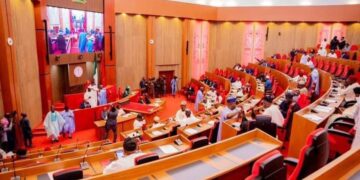Says 39 meetings before passing tax reform bills
By James Adamu
The Senate on Sunday frowned on the rubber stamp label used by opposition political parties in criticising the National Assembly, saying that it was done without proof or justification.
It denied pandering to the wishes of the executive, insisting that thorough legislative oversight was always observed in its relationship with the other arms of government.
The Leader of the Senate, Sen. Opeyemi Bamidele, while defending the Red Chamber on Sunday, cited the case of the controversial tax reform bills recently passed by the Legislature, arguing that were it to be a rubber stamp, the extensive work down on them would have been unnecessary.
The Directorate of Media and Public Affairs, Office of the Leader, in a statement quoted Bamidele as saying that the Senate and the executive amendment held 39 meetings before the tax bills were passed, an indication of a thorough work before they were passed.
Bamidele recalled how the tax bills, laid before the legislature in November 2024, spent six months before they were eventually passed recently after all the grey areas were sorted.
The Senate leader stated, “If we are actually a rubber stamp parliamentary institution as most opposition political parties have claimed, the bills would have been passed within one week or two weeks after they were laid before us.
“In the process of passing the bills, both executive and legislative arms held over 39 engagements to trash grey areas in the Tax Reform Bills, 2024 before both chambers of the National Assembly eventually passed the bills.
“During this period, the engagements involved diverse interests and stakeholders across the federation. The tax reform bills could have been rushed within one or two weeks. But it took us six months to secure input from all critical stakeholders – civil society organisations, professional bodies, religious leaders and leaders of thoughts.
“The process includes all behind-the-scenes efforts, closed door meetings and subtle disagreements that took place between the legislature and the executive before their passage. We also organised public hearings just to accommodate inputs from diverse interests.
“We extended our engagements to all captains of industries to enable us pass the tax reform bills that will stand the test of time; meet the needs of our people and ensure the overriding public interest in the exercise of our constitutional mandates.
“At the end of it, we found a way of resolving all issues around the tax reform bills in the overriding public interest. But people do not know all the efforts and sacrifices we made to ensure the effective delivery of public goods. They were only eager to label us a rubber stamp when the bills came from the executive.”
Bamidele explained that the National Assembly at different times invited the executive for engagement with a view to thrashing out grey areas in the bills.
The leader also raised the case of the 2025 Appropriation Act, which according to him, was laid before the joint session of the National Assembly on Wednesday, 18th December 2024, but passed on February 13, 2025.
Bamidele further stated that if the National Assembly was actually a rubber stamp, it could have hastened the passage of the 2025 Appropriation Bills by the end of the 2024 fiscal year in order to sustain the January to December budget cycle, which had become the country’s practice in recent times.
He added, “We did not give the budget back to the executive until February 2025. We did a lot of due diligence. Every committee of the National Assembly duly engaged heads of agencies to properly scrutinise the budget also in the overriding public interest.
“We are working in the interest of the people. We are always taking into consideration the need to ensure good governance in all our undertakings and the need to use legislative frameworks to promote good governance in the federation.”











































Discussion about this post